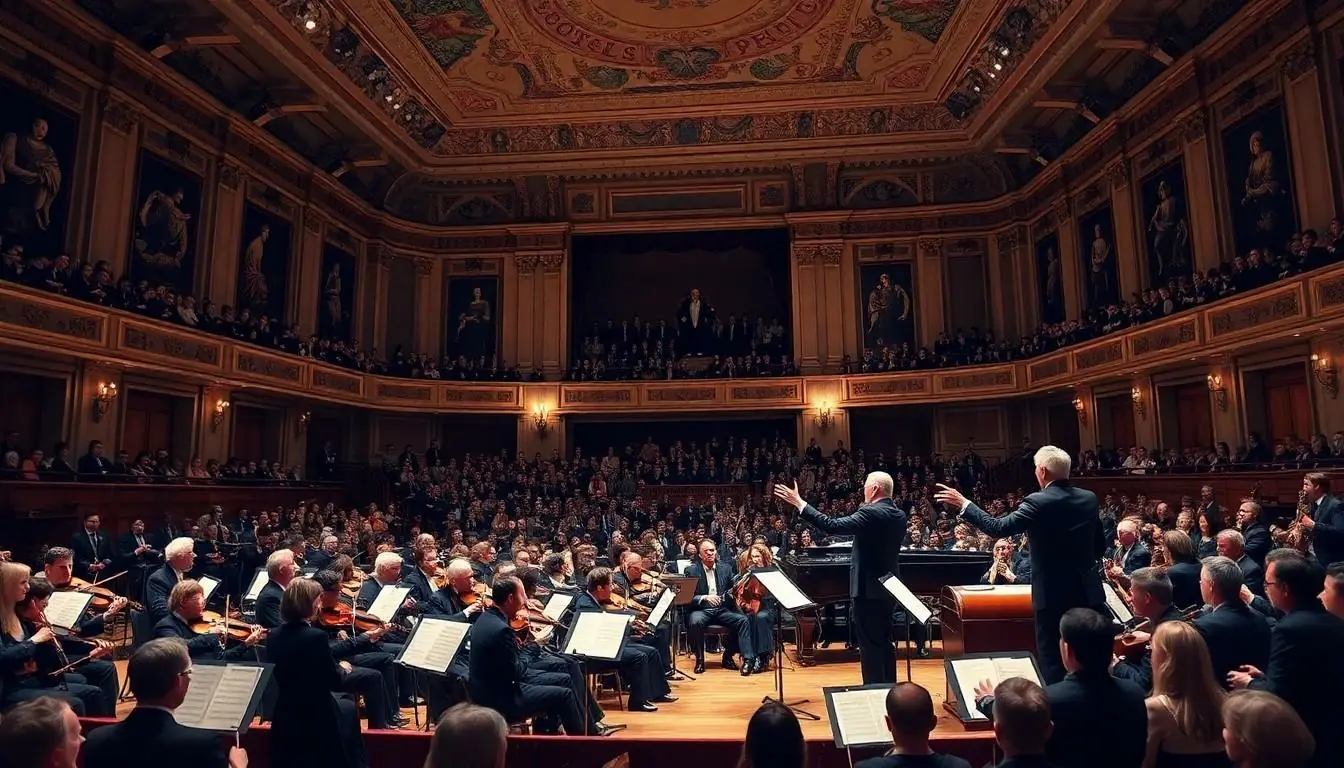Pop music icons aren’t just artists; they’re cultural phenomena that shape our playlists and our lives. From catchy hooks to unforgettable dance moves, these stars have a magical ability to get stuck in your head—whether you like it or not. Who hasn’t belted out a tune in the shower or tried to nail that viral dance challenge?
Table of Contents
ToggleOverview of Pop Music Icons
Pop music icons represent significant cultural figures who shape trends and influence public perception. Their ability to craft hit songs often leads to widespread recognition across diverse audiences. Artists like Michael Jackson and Madonna redefined the genre with unique styles and groundbreaking music videos.
Staying relevant, these icons adapt to changing musical landscapes. Current stars, such as Taylor Swift and Ariana Grande, continue this legacy, merging genres and appealing to younger generations. Their collaboration with other artists often creates chart-topping hits that dominate playlists.
Pop music icons frequently utilize social media to connect with fans and promote their work. These platforms allow artists to share behind-the-scenes content and engage with followers directly. Viral challenges often arise from their music, leading to increased popularity and audience participation.
Cultural impact extends beyond music. Iconic performances, such as Beyoncé’s halftime shows, captivate viewers and set new standards for live entertainment. Fashion choices also reflect their influence, with trends emerging directly from their public appearances.
Legacy shapes perceptions of pop music icons over time. Many artists hold Grammy Awards and remain influential long after their peak popularity. Contributions to music often impact future generations, inspiring emerging artists to pursue careers in pop.
Pop music icons play crucial roles as ambassadors of culture and self-expression. They convey messages that resonate with listeners and spark conversations about pressing social issues. Through their art, they leave lasting impressions that shape not only the music industry but also society as a whole.
Influential Pop Music Icons of the Past

Pop music icons have significantly shaped the music landscape, leaving lasting impacts on culture and society. They’ve created timeless songs while setting trends that resonate through generations.
The Beatles
The Beatles revolutionized pop music in the 1960s. Their innovative songwriting and harmonious melodies redefined how music was produced and consumed. Tracks like “Hey Jude” and “Let It Be” remain timeless classics. Their influence extended beyond music, impacting fashion and lifestyle choices. The band’s use of experimental techniques influenced countless artists, and they remain a benchmark for future musicians. Records full of creativity showcased their ability to evolve with changing times, leading to a legacy that endures.
Madonna
Madonna emerged as a cultural icon in the 1980s, blending music with themes of empowerment and sexuality. Known for hits such as “Like a Virgin” and “Hung Up,” she constantly reinvented her image while pushing boundaries. Her music videos became visual spectacles that often sparked conversations. By embracing controversy, she encouraged open discussions about gender and identity. Fashion choices inspired trends, positioning her as a style leader. As a result, she’s a powerful role model, influencing generations of artists and fans alike.
Michael Jackson
Michael Jackson, dubbed the King of Pop, left an indelible mark on the industry. His groundbreaking album “Thriller” set records, selling over 66 million copies worldwide and showcasing his unmatched talent. Signature dance moves like the moonwalk captivated audiences, making each performance unforgettable. He masterfully blended genres, appealing to a wide audience while tackling themes of love, racial equality, and social issues in songs like “Black or White.” His influence continues to inspire artists today, securing his place as a pop culture legend.
Contemporary Pop Music Icons
Pop music maintains a vibrant landscape, defined by contemporary icons driving its evolution. These artists captivate audiences globally, continuing the legacy of their predecessors.
Taylor Swift
Taylor Swift stands out for her songwriting prowess and genre versatility. Transitioning from country to pop, she consistently captures personal narratives that resonate with listeners. Her album “1989” marked a pivotal change, introducing a synth-pop style that dominated charts. Engaging with fans through social media amplifies her presence, as she shares insights into her creative process. Swift’s influence extends beyond music, with various philanthropic efforts and advocacy for artists’ rights, solidifying her as a modern cultural icon.
Beyoncé
Beyoncé represents empowerment and artistry in pop music. Known for her powerful vocals and innovative performances, she demonstrates remarkable stage presence. Her visual album “Lemonade” challenged societal norms and sparked critical conversations about race and identity. With her ability to blend genres, she continuously redefines the boundaries of pop music. Collaborations with various artists enhance her influence, and her role as a businesswoman further exemplifies her prominence in the industry. Beyoncé inspires many through her music and message of self-love and resilience.
Justin Bieber
Justin Bieber’s journey in pop music showcases growth and transformation. Rising to fame as a teen idol, he evolved into a mature artist with diverse musical styles. Albums like “Purpose” and “Changes” highlight his exploration of personal themes and collaboration with various genres. Engaging with fans on platforms like Instagram fosters a strong connection and loyalty among his audience. Bieber’s candidness about mental health struggles resonates with many, furthering his relatability. His ongoing evolution solidifies his status as a significant figure in contemporary pop culture.
Impact of Pop Music Icons on Culture
Pop music icons significantly reshape cultural landscapes, influencing music choices and everyday life. Their ability to create catchy songs and memorable dance moves often leads to spontaneous singing and viral dance challenges, engaging millions. Michael Jackson and Madonna excelled in redefining pop music with unique styles and innovative music videos. Taylor Swift and Ariana Grande carry this legacy forward, merging genres and appealing to younger audiences, enhancing their cultural relevance.
Cultural presence plays a crucial role in shaping trends and public perception. Social media serves as a powerful tool for these artists, allowing them to connect with fans and share exclusive content. Viral challenges frequently emerge, boosting their popularity and reach.
Beyond music, pop music icons significantly impact entertainment through iconic performances and distinctive fashion choices. These elements set new standards and influence trends across various media. Legacy marks include numerous awards and lasting influence, inspiring future generations of artists.
Exploration of past icons reveals their transformative roles in music history. The Beatles revolutionized pop in the 1960s with innovative songwriting and harmonious melodies, altering fashion and lifestyle choices. Madonna, emerging in the 1980s, blended music with themes of empowerment and sexuality, while Michael Jackson captivated audiences with his groundbreaking album “Thriller” and signature dance moves.
Contemporary figures like Taylor Swift, Beyoncé, and Justin Bieber continue to drive pop music’s evolution. Swift is recognized for her songwriting versatility and engagement with fans through social media. Beyoncé utilizes powerful performances and visual albums to challenge societal norms and inspire discussions about race and identity. Justin Bieber’s journey reflects personal growth, transitioning from a teen idol to a mature artist, addressing themes that resonate deeply with his audience. These contemporary icons maintain the vibrancy of pop music and amplify its cultural significance.
Pop music icons undeniably shape the cultural landscape through their music and influence. They not only entertain but also inspire conversations about important social issues. Their ability to connect with audiences on multiple levels ensures their relevance across generations.
As these artists continue to evolve, they push boundaries and redefine what it means to be a pop star. The legacies of both past and present icons remind us of the power of music to unite people and spark change. With each new generation of artists, the impact of pop music icons will only grow stronger, leaving an indelible mark on the industry and society.




